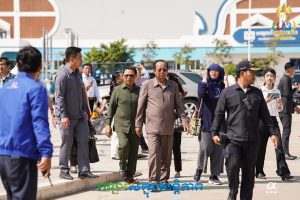It was the right decision, but the fact it took so long to make, and was seemingly only made after all of the alternatives had been exhausted, shows something about the state of affairs in Cambodian politics. On March 30, Prime Minister Hun Sen announced through his Telegram channel (now his preferred means of communicating directly with the public) that broadcasting and tickets for the Southeast Asian Games next month and the ASEAN Para Games the month after will be free.
One wishes Cambodia all the best with the Games, the first time it will host them. But given the fact that this announcement came in the final days of March, less than five weeks before the start of the events on May 5, it’s clear that they were never intended to be free. Vietnam held the last iteration of the Games in 2021 and charged a symbolic $10,000 for live broadcasting rights. Reports suggest that Cambodia’s organizers were trying to charge Thailand around $800,000 for this year’s live broadcasts, so one presumes it was a similar price for other Southeast Asian countries. Thai media reported that “Thai sports authorities have indicated that they might not want to pay what they described as the excessive fee Cambodia planned to charge.”
In mid-March, the Cambodia SEA Games Organizing Committee (CAMSOC) took to Facebook to assert that it had sold around 50 percent of broadcasting rights for the SEA Games and Para Games. CAMSOC’s general secretary, Vath Chomroeun, a former wrestler, expanded on this to say that the rights had been sold to the national broadcasters of Cambodia, Vietnam, Malaysia, Indonesia, and Singapore. (Note that he only mentioned at the time that Timor-Leste, the region’s poorest country, would get free broadcasting rights.) Certainly on the broadcast rights issue, it appears CAMSOC had wanted to charge over the odds but was forced to roll back after it found it couldn’t.
When announcing the free tickets, Hun Sen took the view: “We spent millions of U.S. dollars and we have spent many years to organize this event; therefore, how can we sell tickets to our own people? How much can we get [from selling tickets]?” One might say, however, that these aren’t really free tickets. It was taxpayers who paid for the Games in the first place. In January, Hun Sen said that the Cambodian state has spent around $120 million over three years on this event, although it’s likely to end up much higher (whether the government provides a final tally is another matter).
If the Games do end up costing the Cambodian state around $120 million to organize, that works out at around $7 per Cambodian. And given that less than a tenth of the population would realistically be able to attend any of the events, that’s not an insignificant outlay of taxpayers’ money. But a general election is coming up in July, so giving away tickets gratis makes sense as a populist gesture. Hun Sen has already said he sees hosting the Games as a way of boosting Cambodia’s international profile, as is the case for any country that hosts a major sporting event, so giving away free broadcasting rights abroad makes sense, too.
As is usual in Cambodian politics, it smells like certain officials are trying to make as much money as possible (and we don’t really know how many kickbacks have been pocketed from the awarding of contracts related to the Games.) But then they had to turn to Hun Sen to sort out the situation after their incompetence prompted pushback, as is usually the case whenever a minister comes up against a problem. Up until early March, there were also concerns that the WorldBridge Sports Village wouldn’t be completed on time. Hun Sen gave off a sense of frustration, too. Speaking on March 30, he let on: “We have worked so hard for this event, and the money from the ticket sales is not worth it…I could not believe that some officials did not think of this before.”
Who are those officials? CAMSOC’s president is Defense Minister Tea Banh. Vice-Presidents include Minister of Tourism Thong Khon (who is also the rotating president of the SEA Games Federation) and Information Minister Khieu Kanharith. Perhaps it is an uncharitable view, but the CAMSOC organizers have shown themselves to be of the “old school” sort. Not incidentally, Tea Banh is 77, and Thong Khon and Khieu Kanharith are 71, and all three are likely to be pushed into the background after July’s general election. As Cambodia prepares to undergo its once-in-a-lifetime political transition, which will involve a sweeping “generational succession” of the ruling party and see Hun Sen hand over power to his eldest son Hun Manet, the promise is that many of the aging grandees will be retired to make way for younger, technocratic (and potentially less corrupt) officials.
No one really thinks this will be meritocratic; those now being rushed through the ranks are the children and family members of the current elite. But the promise of the CPP’s Young Turks is that they’ll be competent and able to manage their ministries without crying to Hun Sen (and thereafter Hun Manet) to sort out every mistake.

































